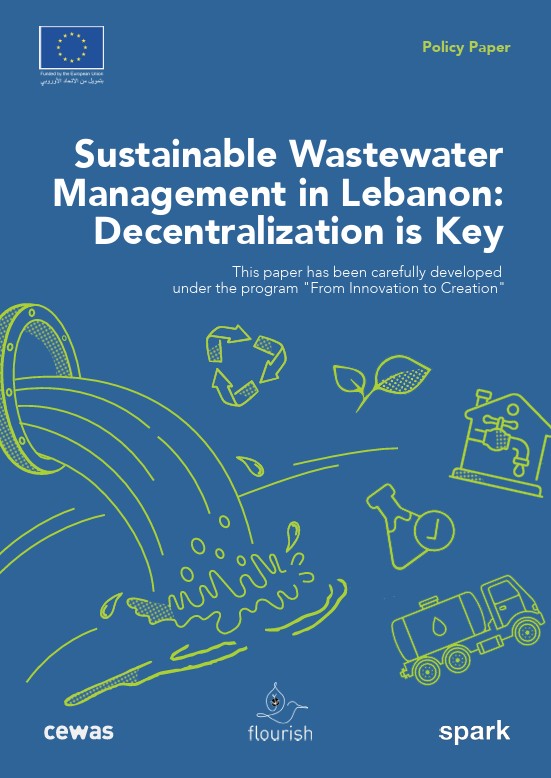Sustainable Wastewater Management in Lebanon: Decentralization is Key
 |
dossier, étude , outil d'aide à la décision Jan 2024 ; 36 pages
Ed. CEWAS - Willisau CEWAS - Beirut
Téléchargeable sous format: PdF
Téléchargeable chez l'éditeur
Page de présentation d'un éditeur
Abstract:
This policy paper outlines a comprehensive roadmap for addressing Lebanon’s wastewater treatment challenges, emphasizing short-, mid-, and long-term measures. The proposed policy measures aim to create a robust and sustainable wastewater management framework that leverages decentralized systems, fosters innovation, and ensures environmental and public health protection. By incorporating entrepreneurial solutions and promoting cohesive collaborative action among involved stakeholders, the paper provides a strategic plan to develop a resilient wastewater management system that addresses current issues, and anticipates future needs in Lebanon. The recommendations are based on research, interviews, local expertise, and consultations with stakeholders, ensuring their feasibility and relevance. Contents:
-Aim of this Policy Paper
-Lebanon’s approach to wastewater treatment is failing
>The wastewater situation in Lebanon
>The impact on the human and environmental health
>A lack of operational capacity and an insufficient regulatory framework
-The case for supporting and investing in Wastewater Entrepreneurship
>Decentralized wastewater treatment systems need to be part of the solution
>Decentralized wastewater business models
>Understanding the needs, opportunities, and threats for entrepreneurs
-Roadmap for supporting Decentralized Wastewater
>Short-term Measures
>Mid-term Measures
>Long-term Measures
-Recommendations and Next Steps
-Annexes: Basics of the legal structure of the water and wastewater sector
Mots clefs: |
eaux usées (évacuation des ) (CI) (DT) (OP) (ope) , eaux usées (traitement des ) (CI) (DT) (OP) (ope) , mode de gestion/gouvernance (CI) (DT) (OP) (ope) |
Pays concerné: |
Editeurs/Diffuseurs: |
|
CEWAS
-
International center for water management services - Willisau - Suisse |
CEWAS
-
International center for water management services Middle East - Beirut - Liban |
En cas de lien brisé, nous le mentionner à communication@pseau.org